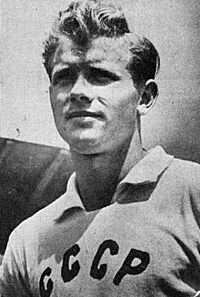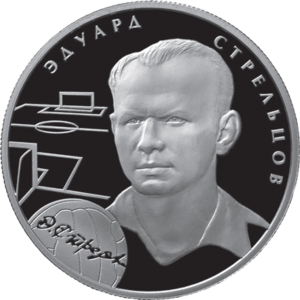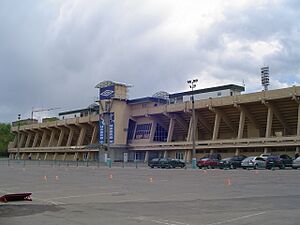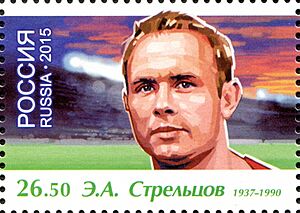Eduard Streltsov facts for kids

Streltsov, photographed in USSR colours, c. 1955–58
|
|||
| Personal information | |||
|---|---|---|---|
| Full name | Eduard Anatolyevich Streltsov | ||
| Date of birth | 21 July 1937 | ||
| Place of birth | Perovo, Moscow, Russian SFSR, USSR | ||
| Date of death | 22 July 1990 (aged 53) | ||
| Place of death | Moscow, Russian SFSR, USSR | ||
| Position(s) | Forward Attacking midfielder |
||
| Youth career | |||
| 1950–53 | Fraser | ||
| Senior career* | |||
| Years | Team | Apps | (Gls) |
| 1953–1958 | Torpedo Moscow | 89 | (48) |
| 1965–1970 | Torpedo Moscow | 133 | (51) |
| Total | 222 | (99) | |
| International career | |||
| 1955–1968 | Soviet Union | 38 | (25) |
| *Club domestic league appearances and goals | |||
Eduard Anatolyevich Streltsov (Russian: Эдуа́рд Анато́льевич Стрельцо́в; 21 July 1937 – 22 July 1990) was a famous Soviet football player. He played as a forward for Torpedo Moscow and the Soviet national team. He played during the 1950s and 1960s.
Eduard was a strong and skilled attacking player. He scored many goals for the Soviet Union. Some people called him "the greatest outfield player Russia has ever produced." He was even nicknamed "the Russian Pelé" because he was so good.
Born in Moscow, Streltsov joined Torpedo at age 16 in 1953. He played for his country two years later. He helped his team win the gold medal at the 1956 Melbourne Olympics. In 1957, he was ranked seventh for the 1957 Ballon d'Or award.
Streltsov was named Soviet Footballer of the Year in 1967 and 1968. He was known for new moves, like the back-heeled pass. This move became known in Russia as "Streltsov's pass." He retired in 1970 and passed away in 1990 from throat cancer. Six years later, Torpedo renamed their home stadium "Eduard Streltsov Stadium" to honor him. You can find statues of Streltsov outside this stadium and at the Luzhniki Olympic Complex in Moscow.
Contents
Early Life and First Steps in Football
Growing Up in Moscow
Eduard Anatolyevich Streltsov was born in Perovo, a part of eastern Moscow. This was on 21 July 1937. His father, Anatoly Streltsov, was a soldier. His mother, Sofia Frolovna, raised Eduard by herself. She worked at a factory to support them.
Eduard had a simple childhood. He loved playing football. His favorite team was Spartak Moscow.
Joining Torpedo Moscow
The factory where his mother worked noticed his talent early. Streltsov became the youngest player on the Fraser Factory football team at 13. In 1953, when he was 16, his factory team played a friendly match against a youth team from Torpedo Moscow.
Streltsov played so well that he impressed the Torpedo coach, Vasily Provornov. Eduard then joined Torpedo Moscow.
Football Career Highlights
Starting with Torpedo and the National Team
At 16, Streltsov played his first game for Torpedo in 1954. He played in every league game that season. He scored four goals. In his second season (1955), he was the best goal scorer in the league. He scored 15 goals in 22 games.
Halfway through 1955, Streltsov was chosen for the Soviet national team. His first game was against Sweden on 26 June. He scored three goals in the first half! The Soviet team won 6–0. In his next game against India, he scored three more goals. By early 1956, Streltsov had scored seven goals for the Soviet Union in just four matches.
Olympic Gold Medalist
Streltsov kept scoring goals for Torpedo. He scored 12 league goals in 1956. In November 1956, the Soviet team went to the Olympic Games in Melbourne. Streltsov scored three goals in a big win against Australia. He then scored a winning goal against the United Team of Germany.
In the semi-final against Bulgaria, the game was tied after 90 minutes. Two Soviet players were injured. Streltsov played amazingly. He scored a goal to tie the game again. Then, he helped Boris Tatushin score the winning goal. Streltsov did not play in the final game against Yugoslavia. The team manager wanted two forwards from the same club. Nikita Simonyan took his place. After the Soviet team won, Simonyan offered Streltsov his gold medal. Streltsov said, "Nikita, I will win many other trophies." He later received his own gold medal in 2006.
Return to Football and More Success
Streltsov helped Torpedo win the Soviet championship in 1965. He scored 12 goals in 26 league matches. He came second in the voting for Soviet Footballer of the Year. This was the second time Torpedo won the league.
He played in his first European club game in 1966 against Inter Milan. He also returned to the Soviet national team in October 1966. He scored his first goal back for his country against East Germany. Torpedo reached the final of the Soviet Cup in 1966 but lost.
Later Career and Retirement
Streltsov played well for the Soviet team in 1967. He played in eight games in a row. He scored goals against France and Austria. He also scored three goals against Chile. He was voted Soviet Footballer of the Year at the end of 1967.
In 1968, Streltsov played his last game for the USSR. He had scored 25 goals in 38 matches for his country. Torpedo won the Soviet Cup in 1968. Streltsov was again named Soviet Footballer of the Year. He scored 21 goals that season, his highest ever. He played as a midfielder in his last two years. He retired from football in 1970 at age 33. He scored 99 goals in 222 games for Torpedo.
After Football
Coaching and Legacy
After retiring, Streltsov stayed with Torpedo. He studied football coaching. He became a youth team manager for Torpedo. He also briefly managed the main team. He later returned to coaching the youth team in 1982.
Eduard Streltsov passed away in 1990 from throat cancer. In 2006, he was given his Olympic gold medal. This happened because the rules changed to give medals to all team members, not just those who played in the final.
How He Played and His Impact
A Special Player
Many people think Streltsov was one of the best football players from Russia or the Soviet Union. He was a tall, strong forward. He had amazing control of the ball and was very smart on the field. One writer said he was "the greatest outfield player Russia has ever produced."
Streltsov had a unique and creative way of playing. He was famous for inventing the back-heeled pass. This move became known as "Streltsov's pass" in Russia. When he was younger, he was fast and strong. As he got older, he used his skill and intelligence more. He played further back on the field, helping his teammates score goals.
Honoring a Legend
In 1996, Torpedo Moscow's home ground was renamed the "Eduard Streltsov Stadium." The next year, the Russian Football Union created the Strelyets prizes. These were important awards for the best players and managers in Russian football.
Statues of Streltsov were built to honor him. One is at Moscow's Luzhniki Olympic Complex. Another stands outside the stadium named after him.
Honours and Achievements

Torpedo Moscow
- Soviet Top League: 1965
- Soviet Cup: 1968
- Runner-up
- Soviet Top League: 1957
- Soviet Cup: 1966
International
- 1955–68: 38 caps, 25 goals
- Summer Olympics gold medal: 1956
Individual
- The best 33 football players of the Soviet Union (7): No. 1 (1955-1957, 1965, 1967, 1968), No. 2 (1966)
- Soviet Footballer of the Year: 1967, 1968; Second Place: 1965
- Soviet Top League top goalscorer: 1955 (15 goals from 22 matches)
- Ballon d'Or: 13th place (1956), 7th place (1957)
Career statistics
- Statistics for domestic cup competitions unknown at this time save 1968 Soviet Cup.
| Club performance | League | Cup | League Cup | Continental | Total | |||||||
|---|---|---|---|---|---|---|---|---|---|---|---|---|
| Season | Club | League | Apps | Goals | Apps | Goals | Apps | Goals | Apps | Goals | Apps | Goals |
| Soviet Union | League | Soviet Cup | Federation Cup | Europe | Total | |||||||
| 1954 | Torpedo Moscow | Soviet Top League | 22 | 4 | – | – | – | – | – | – | 22 | 4 |
| 1955 | 22 | 15 | – | – | – | – | – | – | 22 | 15 | ||
| 1956 | 22 | 12 | – | – | – | – | – | – | 22 | 12 | ||
| 1957 | 15 | 12 | – | – | – | – | – | – | 15 | 12 | ||
| 1958 | 8 | 5 | – | – | – | – | – | – | 8 | 5 | ||
| 1965 | Torpedo Moscow | Soviet Top League | 26 | 12 | – | – | – | – | – | – | 26 | 12 |
| 1966 | 31 | 12 | – | – | – | – | 2 | 0 | 33 | 12 | ||
| 1967 | 20 | 6 | – | – | – | – | 4 | 3 | 24 | 9 | ||
| 1968 | 33 | 21 | 6 | 3 | – | – | 3 | 0 | 42 | 24 | ||
| 1969 | 11 | 0 | – | – | – | – | – | – | 11 | 0 | ||
| 1970 | 12 | 0 | – | – | – | – | – | – | 12 | 0 | ||
| Country | Soviet Union | 222 | 99 | 6 | 3 | – | – | 9 | 3 | 237 | 105 | |
| Total | 222 | 99 | 6 | 3 | – | – | 9 | 3 | 237 | 105 | ||
| Soviet Union national team | ||
|---|---|---|
| Year | Apps | Goals |
| 1955 | 4 | 7 |
| 1956 | 8 | 4 |
| 1957 | 8 | 7 |
| 1958 | 1 | 0 |
| 1959 | 0 | 0 |
| 1960 | 0 | 0 |
| 1961 | 0 | 0 |
| 1962 | 0 | 0 |
| 1963 | 0 | 0 |
| 1964 | 0 | 0 |
| 1965 | 0 | 0 |
| 1966 | 3 | 1 |
| 1967 | 12 | 6 |
| 1968 | 2 | 0 |
| Total | 38 | 25 |
International goals
- Scores and results list the Soviet Union's goal tally first.
| # | Date | Venue | Opponent | Score | Result | Competition |
|---|---|---|---|---|---|---|
| 1. | 26 June 1955 | Råsunda Stadium, Stockholm | 1–0 | 6–0 | Friendly | |
| 2. | 2–0 | |||||
| 3. | 4–0 | |||||
| 4. | 16 September 1955 | Dynamo Stadium, Moscow | 2–0 | 11–1 | Friendly | |
| 5. | 4–0 | |||||
| 6. | 7–0 | |||||
| 7. | 23 October 1955 | Dynamo Stadium, Moscow | 1–1 | 2–2 | Friendly | |
| 8. | 23 May 1956 | Dynamo Stadium, Moscow | 3–0 | 5–1 | Friendly | |
| 9. | 15 September 1956 | Niedersachsenstadion, Hanover | 1–0 | 2–1 | Friendly | |
| 10. | 24 November 1956 | Olympic Park Stadium, Melbourne | 2–0 | 2–1 | 1956 Summer Olympics | |
| 11. | 5 December 1956 | Olympic Park Stadium, Melbourne | 1–1 | 2–1 | 1956 Summer Olympics | |
| 12. | 1 June 1957 | Central Lenin Stadium, Moscow | 1–1 | 1–1 | Friendly | |
| 13. | 21 July 1957 | Vasil Levski National Stadium, Sofia | 1–0 | 4–0 | Friendly | |
| 14. | 3–0 | |||||
| 15. | 15 August 1957 | Helsinki Olympic Stadium, Helsinki | 6–0 | 10–0 | 1958 World Cup qualifier | |
| 16. | 8–0 | |||||
| 17. | 22 September 1957 | Népstadion, Budapest | 2–1 | 2–1 | Friendly | |
| 18. | 24 November 1957 | Zentralstadion, Leipzig | 1–0 | 2–1 | 1958 World Cup qualifier | |
| 19. | 23 October 1966 | Central Lenin Stadium, Moscow | 1–0 | 2–2 | Friendly | |
| 20. | 3 June 1967 | Parc des Princes, Paris | 4–2 | 4–2 | Friendly | |
| 21. | 11 June 1967 | Central Lenin Stadium, Moscow | 4–3 | 4–3 | Euro 1968 qualifier | |
| 22. | 8 October 1967 | Vasil Levski National Stadium, Sofia | 1–1 | 2–1 | Friendly | |
| 23. | 17 December 1967 | Estadio Nacional de Chile, Santiago | 2–0 | 4–1 | Friendly | |
| 24. | 3–0 | |||||
| 25. | 4–0 |
See also
 In Spanish: Eduard Streltsov para niños
In Spanish: Eduard Streltsov para niños
 | William M. Jackson |
 | Juan E. Gilbert |
 | Neil deGrasse Tyson |



